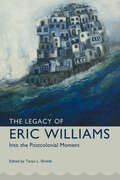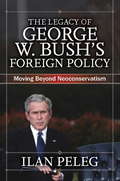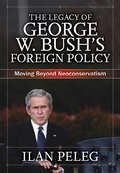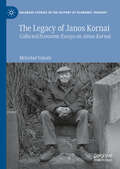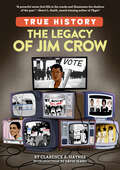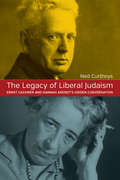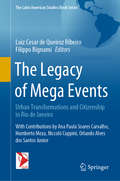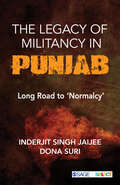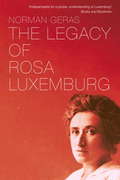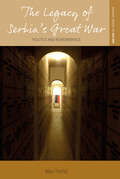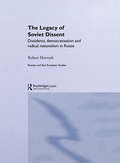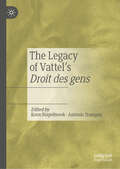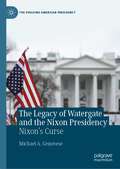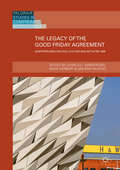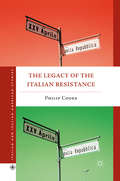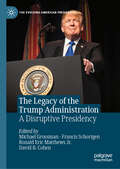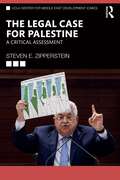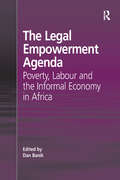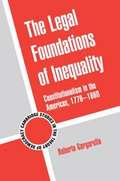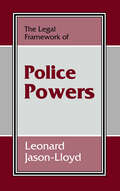- Table View
- List View
The Legacy of Eric Williams: Into the Postcolonial Moment (Caribbean Studies Series)
by Tanya L. ShieldsThe Legacy of Eric Williams provides an indispensable and significant understanding of Eric Williams's contributions to the now independent nation of Trinidad and Tobago and his impact on the broader international understanding of the Caribbean. This book stands out because of its simultaneous investigation into Eric Williams as a scholar/intellectual, a political leader, and, most importantly, a key postcolonial figure. Most previous studies have treated these as separate arenas.The essays here confront the relevance of postcolonialism in understanding Williams's role both in post-independence Trinidad and Tobago and in newer understandings of Caribbean globalization. The volume divides into three broad sections--"Becoming Eric Williams," "Political Williams," and "Textual Williams." "Becoming Eric Williams" provides background on Williams and the Caribbean's ontological quest, addressing what it means to be West Indian and Caribbean. "Political Williams" engages with his policies and their consequences, describing the impact of Williams's political policies on several areas: integration, color stratification, and labor and public sector reform. Williams's far-reaching political influence in these aspects cements his legacy as one of the main public intellectuals responsible for creating the modern Caribbean. "Textual Williams" examines his scholarly contributions from a more traditional academic perspective. These sections allow for a comprehensive understanding of Williams as a man, a scholar, and a politician.
The Legacy of George W. Bush's Foreign Policy: Moving beyond Neoconservatism
by Ilan PelegA penetrating analysis of the complex of factors that have shaped George W. BushOCOs foreign policy, with recommendations for future administrations
The Legacy of George W. Bush's Foreign Policy: Moving beyond Neoconservatism
by Ilan PelegThis volume incisively analyzes the foreign policy of George W. Bush. Examining the legacy of the forty-third President, author Ilan Peleg explains the complex factors underlying the Bush Doctrine: neoconservative ideology, real and perceived challenges to US world supremacy, Bush?s personality, the White House?s unique decision-making process, and the impact of September 11. Peleg argues that in its shift from deterrence and containment to prevention and preemption, from multilateral leadership to unilateral militarism, and from consensual realism to radical neoconservatism, the Bush administration has effected a true revolution in the foundational goals, as well as in the means, of US foreign policy. Peleg also offers a series of judicious recommendations for future administrations, including the reestablishment of a bipartisan consensus on foreign policy, increased emphasis on multilateralism, the demilitarization of US foreign policy, renewed focus on the resolution of serious regional conflicts, and more realistic expectations about noncoerced democratization around the world.
The Legacy of Janos Kornai: Collected Economic Essays on Janos Kornai (Palgrave Studies in the History of Economic Thought)
by Mehrdad VahabiThis book examines the intellectual legacy of economist Janos Kornai and explores his unique contribution to economics. It addresses the key themes within Kornai’s work and shows how his ideas relate to the leading figures within economics. After highlighting the influence of Marx and Hayek on Kornai, his major contribution to comparative economics and analysis of capitalist and socialist economic systems is examined. How they fed into his conceptualization of hard and soft budget constraints and complemented his work on economic theory, in particular debates around Walrasian and Marshallian equilibrium theory, is also discussed.This book offers insight into the work of Janos Kornai and his impact upon economics. It will be of relevant to students and researchers interested in the history of economic thought and comparative economics.
The Legacy of Jim Crow (True History)
by Clarence A. Haynes&“A powerful series that fills in the cracks and illuminates the shadows of the past.&” –Sherri L. Smith, award-winning author of Flygirl Introducing a new nonfiction series for the next generation of activists, uncovering the hidden history of the United States through an anti-racist lens.The true story of the discriminatory laws and ideas that affected African American life for generations. In the late nineteenth century, white lawmakers in the United States created a set of policies, collectively called &“Jim Crow,&” that created segregated facilities, like schools and parks, for African Americans in the South. But Jim Crow–type policies didn&’t just affect the South. These policies have had far-reaching effects across America, impacting where Black people live, how they&’re treated by the criminal justice system, and how they&’re portrayed in TV and film. The Legacy of Jim Crow explores the details that have far too often been covered up, along with exclusive interviews with experts, including Pulitzer Prize–winning author Jeffrey C. Stewart.
The Legacy of Liberal Judaism: Ernst Cassirer and Hannah Arendt's Hidden Conversation
by Ned CurthoysComparing the liberal Jewish ethics of the German-Jewish philosophers Ernst Cassirer and Hannah Arendt, this book argues that both espoused a diasporic, worldly conception of Jewish identity that was anchored in a pluralist and politically engaged interpretation of Jewish history and an abiding interest in the complex lived reality of modern Jews. Arendt's indebtedness to liberal Jewish thinkers such as Moses Mendelssohn, Abraham Geiger, Hermann Cohen, and Ernst Cassirer has been obscured by her modernist posture and caustic critique of the assimilationism of her German-Jewish forebears. By reorienting our conception of Arendt as a profoundly secular thinker anchored in twentieth century political debates, we are led to rethink the philosophical, political, and ethical legacy of liberal Jewish discourse.
The Legacy of Mega Events: Urban Transformations and Citizenship in Rio de Janeiro (The Latin American Studies Book Series)
by Ana Paula Carvalho Humberto Meza Niccoló Cuppini Orlando Alves dos Santos JuniorThis edited volume offers a critical reflection on the failed experiment to redevelop the city of Rio de Janeiro according to the neoliberal strategy of entrepreneurial urban governance and mercantile regulatory transformations, which were leveraged by mega-sporting events. The case of Rio de Janeiro is presented as an example of a failing global strategy for urban redevelopment, entrepreneurial urban governance and the realization of mega-events. This book aims to present the real and critical state of the legacies of such mega-events. It shows how instead of the promised economic redemption, Rio is experiencing a severe economic, political and social crisis, handling three observation perspectives: the first is the description of urban transformations and mega events, assessing the contradictions in the model for the intended urban development and taking into account historical factors both at local and national level; the second restricts on neighborhoods as case studies representing an ensign of a neoliberal urban transformation’ results; the third links city and citizenship focusing tensions and inconsistencies and opening up a perspective on the importance of fostering the concept of citizenship, including actions, movements and initiatives that express the resistance and struggles around a possible new destination for Rio de Janeiro.Prof. Luiz Cesar de Quieroz Ribeiro and Dr. Filippo Bignami as General Editors thank Ana Paula Soares Carvalho, Humberto Meza, Niccoló Cuppini and Orlando dos Santos Junior for their contributions as co-editors of this book.
The Legacy of Militancy in Punjab: Long Road to ‘Normalcy’
by Inderjit Singh Jaijee Dona SuriNo man ever steps in the same river twice, for it′s not the same river and he′s not the same man—Heraclitus Militancy convulsed Punjab from roughly 1984 to 1994. Afterwards, politicians, government spokespersons and assorted intellectuals declared that ‘Khalistan’ was gone and the state was ‘returning to normalcy’ as though the state would suddenly find itself in some pleasant place of bygone era. But that is far from the truth.In reality, when the gunfire ceased, 10 years of turmoil left lasting scars and chronic afflictions. Reduced accountability warped administrative and executive ‘culture’ and threat perception coloured the attitude of the judiciary for years. Victimization at the hands of both police and insurgents created risk-averse citizens who prioritized personal safety above all, while policies pertaining to state debt and industry impacted economic development.This book recounts the no-holds-barred struggle to suppress militancy that morphed into an unrestricted abuse of power. It details how militancy affected the credibility of the judiciary, why trials dragged on for 25 years, how militancy influenced the popular culture and how the youth are still responding to conditions in today’s Punjab.
The Legacy of Nuclear Power
by Andrew BlowersNuclear energy leaves behind an infinitely dangerous legacy of radioactive wastes in places that are remote and polluted landscapes of risk. Four of these places - Hanford (USA) where the plutonium for the first atomic bombs was made, Sellafield, where the UK’s nuclear legacy is concentrated and controversial, La Hague the heart of the French nuclear industry, and Gorleben, the focal point of nuclear resistance in Germany - provide the narratives for this unique account of the legacy of nuclear power. The Legacy of Nuclear Power takes a historical and geographical perspective going back to the origins of these places and the ever changing relationship between local communities and the nuclear industry. The case studies are based on a variety of academic and policy sources and on conversations with a vast array of people over many years. Each story is mediated through an original theoretical framework focused on the concept of ‘peripheral communities’ developing through changing discourses of nuclear energy. This interdisciplinary book brings together social, political and ethical themes to produce a work that tells not just a story but also provides profound insights into how the nuclear legacy should be managed in the future. The book is designed to be enjoyed by academics, policy-makers and professionals interested in energy, environmental planning and politics and by a wider group of stakeholders and the public concerned about our nuclear legacy.
The Legacy of Rosa Luxemburg
by Norman GerasNo great socialist thinker has been so often misrepresented as the Polish revolutionary Rosa Luxemburg. In this scrupulous study, tightly argued, Geras systematically considers and refutes the major myths which have developed about her work. He shows how her views on socialist strategy in Russia were closer to those of Lenin than any other leader, and clarifies her famous theory of the mass strike. Her critique of the Bolsheviks after the October Revolution is distinguished from social-democratic or anarchist attacks, to which it has often been assimilated.Widely praised on its first publication, The Legacy of Rosa Luxemburg is an important contribution to our understanding of an earlier generation of Marxism in Poland and Russia.From the Trade Paperback edition.
The Legacy of Second-Wave Feminism in American Politics
by Angie Maxwell Todd ShieldsThis book chronicles the influence of second wave feminism on everything from electoral politics to LGBTQ rights. The original descriptions of second wave feminism focused on elite, white voices, obscuring the accomplishments of many activists, as third wave feminists rightly criticized. Those limited narratives also prematurely marked the end of the movement, imposing an imaginary timeline on what is a continuous struggle for women's rights. Within the chapters of this volume, scholars provide a more complex description of second wave feminism, in which the sustained efforts of women from many races, classes, sexual orientations, and religious traditions, in the fight for equality have had a long-term impact on American politics. These authors argue that even the "Second Wave" metaphor is incomplete, and should be replaced by a broader, more-inclusive metaphor that accurately depicts the overlapping and extended battle waged by women activists. With the gift of hindsight and the awareness of the limitations of and backlash to this "Second Wave," the time is right to reflect on the feminist cause in America and to chart its path forward.
The Legacy of Serbia's Great War: Politics and Remembrance (Making Sense of History #48)
by Alex TomićIn the winter of 1915, following the invasion of Serbia by the Central Powers, the Serbian Army retreated across the mountains of Albania and Montenegro together with thousands of civilians. Around 240,000 lost their lives. Today, the story of the retreat is little known, except in Serbia where it is represents the heroic Serbian sacrifice in the Great War. In this book Alex Tomić examines the centenary events memorializing the First World War with the retreat at its core, and provides a persuasive account of the ways in which the remembrance of Serbian history has been manipulated for political purposes. Whether through commemorations, ceremonies, or grass- root initiatives, she demonstrates how these have been used as distractions from the more recent unexamined past and in doing so provides an important new perspective on the cultural history of commemoration.
The Legacy of Soviet Dissent: Dissidents, Democratisation and Radical Nationalism in Russia (BASEES/Routledge Series on Russian and East European Studies #Vol. 17)
by Robert HorvathDuring the 1970s, dissidents like Sakharov and Solzhenitsyn dominated Western perceptions of the USSR, but were then quickly forgotten, as Gorbachev's reformers monopolised the spotlight. This book restores the dissidents to their rightful place in Russian history. Using a vast array of samizdat and published sources, it shows how ideas formulated in the dissident milieu clashed with the original programme of perestroika, and shaped the course of democratisation in post-Soviet Russia. Some of these ideas - such the dissidents' preoccupation with glasnost and legality, and their critique of revolutionary violence - became part of the agenda of Russia's democratic movement. But this book also demonstrates that dissidents played a crucial role in the rise of the new Russian radical nationalism. Both the friends and foes of Russian democracy have a dissident lineage.
The Legacy of Vattel's Droit des gens
by Koen Stapelbroek Antonio TrampusThis edited collection offers a reassessment of the complicated legacy of Emer de Vattel’s Droit des gens, first published in 1758. One of the most influential books in the history of international law and a major reference point in the fields of international relations theory and political thought, this book played a role in the transformation of diplomatic practice in the eighteenth and nineteenth century. But how did Vattel’s legacy take shape? The volume argues that the enduring relevance of Vattel’s Droit des gens cannot be explained in terms of doctrines and academic disciplines that formed in the late nineteenth and twentieth centuries. Instead, the chapters show how the complex reception of this book took shape historically and why it had such a wide geographical and disciplinary appeal until well into the twentieth century. The volume charts its reception through translations, intellectual, ideological and political appropriations as well as new practical usages, and explores Vattel’s discursive and conceptual innovations. Drawing on a wide range of sources, such as archive memoranda and diplomatic correspondences, this volume offers new perspectives on the book’s historical contexts and cultures of reception, moving past the usual approach of focusing primarily on the text. In doing so, this edited collection forms a major contribution to this new direction of study in intellectual history in general and Vattel’s Droit des gens in particular.
The Legacy of Watergate and the Nixon Presidency: Nixon's Curse (The Evolving American Presidency)
by Michael A. GenoveseThis book examines the Nixon presidency, reviews the events surrounding Watergate and the President’ resignation, and unpacks the effects of Watergate on our politics and public attitudes about the political process. Genovese, a prolific scholar of the American presidency who has published three previous books on Nixon and Watergate, argues that the roots of modern political dysfunction and slash-and-burn politics can be traced to the impact of the Vietnam War, the Watergate Crisis, the policies and activities of the Nixon presidency, and the hyper-partisanship they spawned. Now, 50 years on from the scandal, it is time for a reappraisal of Nixon’s impact and a review of the impact he has had on our political system and political culture.
The Legacy of the French Revolutionary Wars: The Nation-in-Arms in French Republican Memory
by Alan ForrestA major contribution to the study of collective identity and memory in France, this book examines a French republican myth: the belief that the nation can be adequately defended only by its own citizens, in the manner of the French revolutionaries of 1793. Alan Forrest examines the image of the citizen army reflected in political speeches, school textbooks, art and literature across the nineteenth century. He reveals that the image appealed to notions of equality and social justice, and with time it expanded to incorporate Napoleon's victorious legions, the partisans who repelled the German invader in 1814 and the people of Paris who rose in arms to defend the Republic in 1870. More recently it has risked being marginalized by military technology and by the realities of colonial warfare, but its influence can still be seen in the propaganda of the Great War and of the French Resistance under Vichy.
The Legacy of the Good Friday Agreement: Northern Irish Politics, Culture And Art After 1998 (Palgrave Studies In Compromise After Conflict Series)
by Charles I. Armstrong David Herbert Jan Erik MustadThis book provides a multidisciplinary collection of essays that seek to explore the deeply problematic legacy of post-Agreement Northern Ireland. Thus, the authors of this book look at a number of issues that continue to stymie the development of a robust and sustainable peacebuilding project, including segregation, contested parades and flags, ethnic party mobilization, and memorialization. Towards addressing these contemporary issues, authors are drawn from a range of disciplines, including politics, history, literature, drama, cultural studies, sociology, and social psychology.
The Legacy of the Italian Resistance
by Philip CookeThis book adds to this growing body of scholarship on the Italian Resistance by analysing, for the first time, how the 'three wars' are represented over the broad spectrum of Resistance culture from 1945 to the present day. Furthermore, it makes this contribution to scholarship by bridging the gap between historical and cultural analysis. Whereas historians frequently use literary texts in their writings, they are often flawed by an insufficiently nuanced understanding of what a literary text is. Likewise, literary critics who have discussed writers such as Calvino and Vittorini, or films such Pais#65533; and La notte di San Lorenzo, only refer in passing to the historical context in which these works were produced. By fusing historical and cultural analysis, author Philip Cooke makes a unique contribution to our understanding of a key period of Italian history and culture.
The Legacy of the Trump Administration: A Disruptive Presidency (The Evolving American Presidency)
by Michael Grossman David B. Cohen Francis Schortgen Ronald Eric Matthews Jr.This book analyzes the legacy of the first Trump administration on a variety of different fronts. Whether it was the extensive use of Twitter, the tendency to express controversial, and often dubious views, or to even slander foreign leaders, Trump was a disruptive president. The presidency of Donald Trump raises questions for political scientists and researchers. How consequential was he? While he garnered much attention both in and out of the White House, how much of his legacy remains? The authors in this book address these questions with essays that cover an array of issues related to his tenure in office, and the years since. The chapters provide a broad analysis of the legacy of the Trump presidency, focusing on all aspects of his presidency and representing multiple perspectives across the partisan and disciplinary divides. Additionally, the contributions in this book aim to (re-)assess the Trump legacy in light of the subsequent efforts by his successor to undo much of the policies embraced by and implemented during the Trump years.
The Legal Architecture of English Cathedrals (Law and Religion)
by Norman DoeThis original book is a comprehensive, richly documented and critical examination of laws applicable to Anglican cathedrals in England, some of the most iconic monuments in the national heritage and centres of spiritual and cultural capital. Law is the missing link in the emerging field of cathedral studies. The book fills this gap. It explores historical antecedents of modern cathedral law, traces aspects of them that still endure, and explains the law with particular reference to the recommendations of the Archbishops’ Commission on Cathedrals 1994 which led to the most radical changes in the legal history of these churches since the Reformation, culminating in the Cathedrals Measure 1999 and associated later legislation. The book compares the domestic constitutions and statutes of all the cathedrals of the Church of England today – old foundations, new foundations and parish church cathedrals - as well as policies and guidelines applicable to or adopted by them. Whilst national law acts as a fundamental unifying force, there is considerable diversity as between these in terms of the breadth and depth of their coverage of topics. In the socio-legal tradition, the book also explores through interviews with clergy and others, at half of the cathedrals, how laws are experienced in practice. These reveal that whilst much of the law is perceived as working well, there are equally key areas of concern. To this end, the book proposes areas for further research and debate with a view to possible reform. Taking an architectural feature of cathedrals as the starting point for each chapter, from cathedral governance through mission, ministry, music and education to cathedral property, what emerges is that law and architecture have a symbiotic relationship so that a cathedral is itself a form of juristecture.
The Legal Case for Palestine: A Critical Assessment (ISSN)
by Steven E. ZippersteinThis book critically analyzes the Palestinian legal arguments against Israeli occupation and in favor of Palestinian statehood.For the past two decades, Palestinians have chosen to pursue their claims against the Israeli occupation through litigation at the international courts. It is therefore appropriate, the author contends, to analyze the merits of the Palestinian legal claims separately from their political claims. To do so, the book comprises five parts: Part I addresses the role of international law in the conflict as well as Palestinian legal framing and lawfare. Part II recounts the relevant legal history, including the crucial legal implications of the Oslo Accords. Part III analyzes Palestinian legal claims regarding the West Bank and the Gaza Strip. Part IV assesses the Palestinian legal case for statehood. Part V analyzes Palestinian legal claims regarding Jerusalem. Ultimately, it is argued that the Palestinian legal case is weak even though the two-state solution continues to represent the most viable long-term political outcome to the conflict. Moreover, the author suggests that Palestinian leaders have repeatedly opted for conflict perpetuation through lawfare and violence, rather than conflict resolution through negotiation.Providing fresh insights into the claims and counterclaims of Palestinian legal arguments, the book will appeal broadly to anyone interested in the Israeli-Palestinian conflict and international law.
The Legal Dimensions of Oil and Gas in Iraq
by Rex J. ZedalisThis volume presents the first and only comprehensive examination of the legal issues surrounding international debt recovery on claims against Iraqi oil and gas. In addition to presenting a snapshot view of Iraq's outstanding debt obligations and an analysis of the significance of the theory of odious debt in the context of the Iraqi situation, the list of legal issues examined includes relevant provisions of the Iraqi Constitution of 2005, controlling Security Council resolutions, pertinent articles of the KRG oil and gas law (No. 22) of 2007 and the many nuanced and technical questions raised thereby, legal pronouncements aimed at protecting Iraqi oil and gas and those adopted in selected other nations, and general problems associated with recognition and enforcement of awards or judgments that may involve such oil and gas or revenues from the sale thereof. Also discussed are the lessons learned by the handling of the Iraq debt experience and the transferability of those lessons to future situations in which resource-rich nations may have outstanding financial obligations to other members of the world community or their nationals.
The Legal Empowerment Agenda: Poverty, Labour and the Informal Economy in Africa
by Dan BanikDespite providing society with a set of crucial services, large groups of workers in the informal economy are subject to exclusion and discrimination, and their lives are characterised by various types of vulnerabilities and deprivations that result from the denial of social, economic, political and legal protection. Although not new to the development vocabulary, the informal economy has received renewed attention in recent years largely due to the ILO's 'decent work' agenda and various efforts to promote 'legal empowerment of the poor'. With an explicit focus on labour rights, the book focuses on a nuanced understanding of the regulatory and operational challenges and dilemmas related to implementing the two approaches in selected countries in sub-Saharan Africa. In addition to analyzing structures and relations of power between the formal and the informal economies, the book critically discusses the work of governments, civil society organizations and the poor themselves to address the daily challenges of living in the informal economy.
The Legal Foundations of Inequality
by Roberto GargarellaThe long revolutionary movements that gave birth to constitutional democracies in the Americas were founded on egalitarian constitutional ideals. They claimed that all men were created equal with similar capacities and also that the community should become self-governing. Following the first constitutional debates that took place in the region, these promising egalitarian claims, which gave legitimacy to the revolutions, soon fell out of favor. Advocates of a conservative order challenged both ideals and favored constitutions that established religion and created an exclusionary political structure. Liberals proposed constitutions that protected individual autonomy and rights but established severe restrictions on the principle of majority rule. Radicals favored an openly majoritarian constitutional organization that, according to many, directly threatened the protection of individual rights. This book examines the influence of these opposite views during the 'founding period' of constitutionalism in countries including the United States, Argentina, Colombia, Chile, Ecuador, Mexico, Peru, and Venezuela.
The Legal Framework of Police Powers
by Leonard Jason-LloydThe study of police powers forms a significant part of many law courses. This book should prove helpful to a wide readership, including new members of the police service, and those studying civil liberties and constitutional law.
